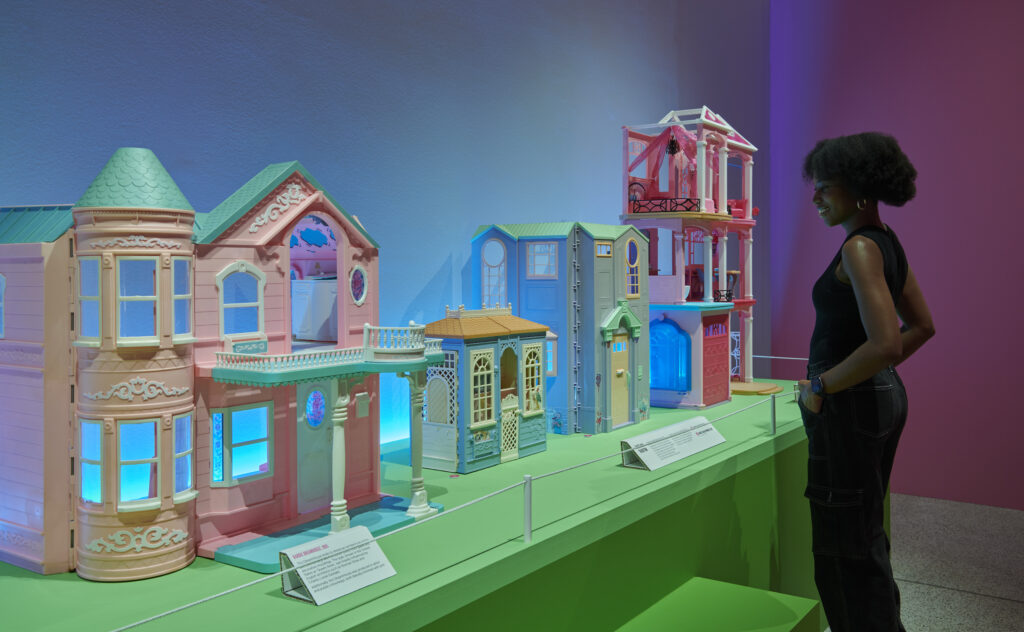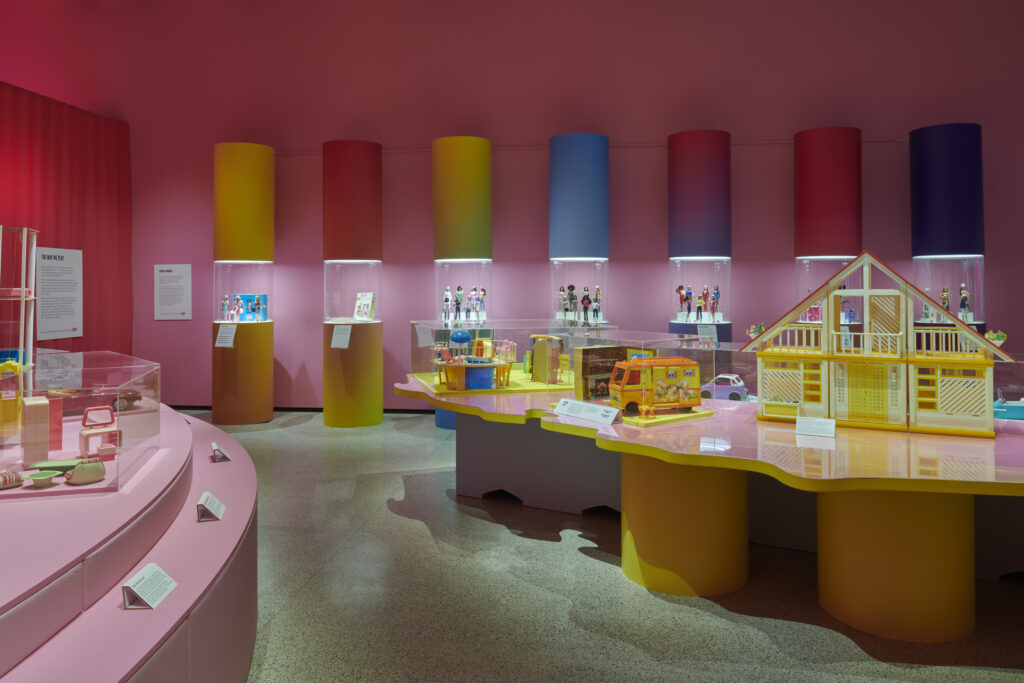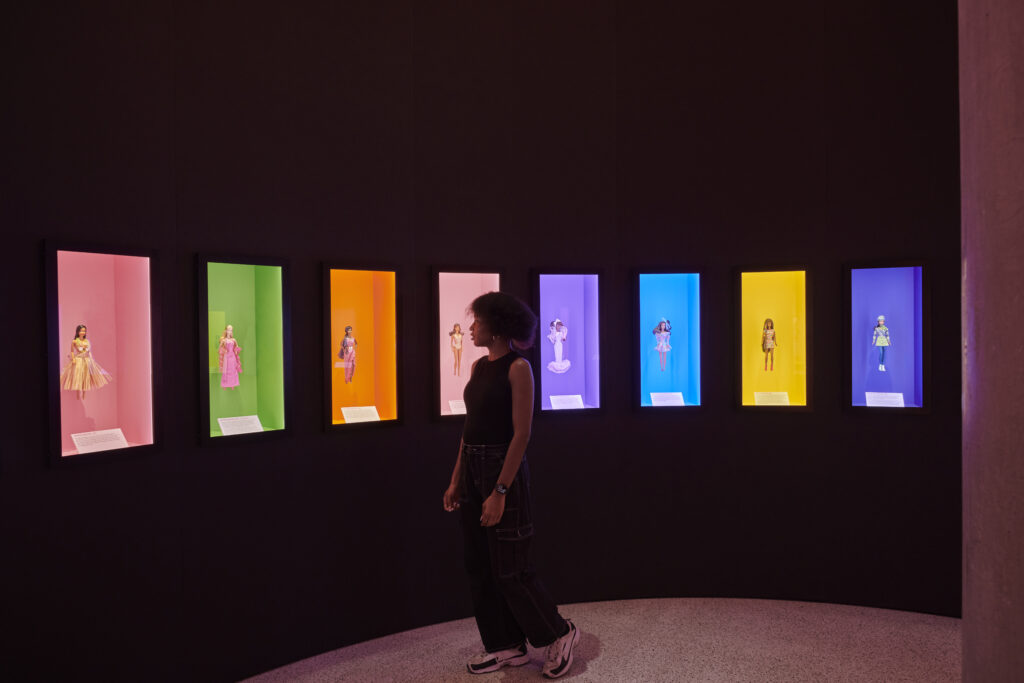Enjoy this article?
Most Museums Journal content is only available to members. Join the MA to get full access to the latest thinking and trends from across the sector, case studies and best practice advice.
This exhibition marks the 65th anniversary of the Barbie brand and has been developed in partnership with toy giant Mattel. The 250 objects include 180 dolls, with a focus on the Barbies and friends, reflecting cultural shifts around representation over the past six decades.
Items from the brand owners’ archive provide insight into the design and production processes that have made – and still make – Barbie happen.
The lower-level exhibition space is reached by a choice of two staircases, with a gallery attendant waving at the bottom of the “in” stairs – a missed opportunity for some fun directional signage. The first of six rooms, which has curved walls of 4m-high hot-pink curtains, features a rare first-edition Barbie rotating proudly on a pedestal.

Number 1 Barbie – or “side-eye Barbie”, as I named her – is the prototype creator Ruth Handler took to the New York Toy Fair in 1959. The first Barbie television ad plays alongside, focusing on beauty and neatness with the aim of convincing parents that the doll would encourage good grooming habits.
Next is a collection of contextual objects, including footage of female workers on the first Barbie production line in Japan and the original patent – printed in pink, of course. A timeline of milestones runs from right to left, confusing a few wearier visitors.
Chronological Barbie logos are printed on corrugated cardboard, a material used throughout the exhibition that contrasts well against the inevitable dominance of plastic.

Just before the pink gets too much, visitors arrive in a stunning gallery of rainbow-lit individual dolls. Each represents a development in design, from moving knees and twisting waists to curvy, tall and petite body shapes. The most fascinating element is the head moulds.
All 30 Black and Hispanic dolls launched between 1980 and 1992 had the same face shape – it wasn’t until the late 1990s that a wider range of features was introduced.
The curators explain how the standard white Barbie face reflects the look of an era, such as a 2007 mould with thinner lips and eyebrows. Two contrasting X-rays of the earliest and latest dolls illustrate how intricate the mechanisms that facilitate movement have become.
Focus on: the Barbie brand of pink
“Think pink”, and you might well think of Barbie – so much so, in fact, that we used that phrase as a title for one of the exhibition sections. The history of pink in Barbie’s world is a fascinating story in its own right; it’s arguably one of the most successful branding exercises of the late 20th century.
The Mattel toy company made a conscious decision to associate Barbie with the colour pink. In 1977, she was relaunched as “Superstar Barbie”, dressed and packaged in a vibrant bubblegum shade. At this point in time, Barbie’s world embraced the entire colour spectrum, including a yellow campervan, a red-and-white Dreamhouse and acid-green furniture.
From about 1980, however, things turned rosy. Barbie’s red-and-white Dreamhouse was reissued in shades of pink, while the furniture, cars, product packaging and much of the doll’s wardrobe were all realised in the same hue.
It’s not coincidental that this colour shift occurred when mainstream consumer taste was tending towards the conservative – the age of Margaret Thatcher and Ronald Reagan. The adoption of Barbie pink went hand in hand with a shift towards hyperfeminine details and traditional motifs throughout the doll’s world.
The colour remains indelibly associated with the brand, so we wanted to reflect that in the exhibition design, while still presenting something that didn’t feel strictly like a Mattel environment.
Working with Sam Jacob Studio, and in collaboration with the Barbie brand design team, we’ve created a show that balances moments of total immersion in pink with unexpected areas that show the doll and her world in a new light.
Danielle Thom is the curator of Barbie: The Exhibition at the Design Museum, London
Next up is (predominantly) the hair room, where little girls were squeaking with excitement. There are no interactive exhibits, but they clearly aren’t needed. Fashion dolls dominate, including some that directly reference cultural icons, such as the late-1960s Marlo Flip Barbie, which was inspired by the actress Marlo Thomas in the That Girl television show.
Seeing all-time bestseller Totally Hair Barbie you really get it: she’s got ankle-length glistening hair (squeak) designed to withstand aggressive styling. Footage from Mattel’s labs shows how hair is attached during the design process. Topping this section off is a chandelier made from multi-toned swathes of Barbie hair.
Curator Danielle Thom said: “Of course, with a pop culture subject like Barbie, there’s a lot of analysis and a lot of contextual stuff to cover. Fundamentally, though, I didn’t want to lose sight of the fact that Barbie is a phenomenon that has brought many people a lot of joy – as a toy, a cultural figurehead and a fashion icon.
Through a combination of colourful and humorous exhibition design, and an appeal to childhood nostalgia, this exhibition has consciously embraced joy as an important part of a visitor’s experience.”
Visitors are gently asked to challenge their default image of blonde Barbie, by being presented with Mattel’s highly promoted efforts to reflect more children’s lived experiences, such as dolls in wheelchairs and one with alopecia.
One label felt a bit close to marketing blurb for Mattel: “Today Barbie has 35 skin tones, four body shapes and various disabilities.” There’s a nod to Ken, with 15 bunched into one case, but it’s definitely Barbie’s party.
The biggest space holds a collection of Dreamhouses (Barbie’s home) and accessories. A toddler viewing them was confused by the first house, from 1962, asking “wood?”, before shouting “plastic!” as materials got more familiar.
A label notes that while Barbie always lived independently, American women in the 1960s had little hope of securing a mortgage without a husband as guarantor.
The interiors are just as effective as the clothes and the dolls themselves in reflecting the trends of the time, with the outdoor living spaces and huge sports cars tying Barbie firmly to her American roots. Common features of the houses evoke memories of play, such as open side walls, slides, pools and lifts.
Aspiration is a running theme, culminating in the “working women” display. Many of Barbie’s 250 careers were ahead of her time. Her launch coincided with the space race, with Astronaut Barbie appearing four years before a man walked on the moon.
She’s also run in most presidential elections, backed by an all-women campaign team in 2020. Last year’s Women in Sports collection includes a football referee and sports journalist. Some dolls may unrealistically reflect today, but by the time the girls whose Barbies owned Dreamhouses in the 1960s grew up, they too could get a mortgage.

The final “icons room”, which is covered in foil from floor to ceiling, doesn’t feel as slick as the rest of the exhibition. The objects are intriguing, from news magazine Time and fashion staple Vogue covers to viral fashion trend “Barbiecore”, illustrated by lurid pink Balmain handbags.
While this space appeals more to adults, visitors of all ages were mesmerised by footage of a TikTok shoot – and the Barbie prop bin is truly the stuff of dreams.
As a toy so synonymous with stereotypes, is Barbie best placed to expand the aspirations of children? Mattel thinks so – and I certainly warmed to the brand through this exhibition. I was hopeful of finding a flat-footed Barbie, and I did, although sadly that’s not her name.
There are intriguing discoveries too, such as pregnant Midge, who scarily came with a removable newborn. Last year’s Barbie movie does more to explore problematic issues around the doll’s unattainability, making it an interesting accompaniment, if you’re not too Barbied out.
The exhibition’s purpose is to showcase Barbie as she turns 65, and it gives an insight into the brand’s scale and influence. Additionally, the museum’s design eye means visitors come away having learned a lot about how a doll is made.
While the audience is mainly young girls with mums or grans, the exhibition appeals to anyone who fancies a joyful couple of hours of colour and fun.
Anna Terry is the former director of the Museum of Brands, London
Most Museums Journal content is only available to members. Join the MA to get full access to the latest thinking and trends from across the sector, case studies and best practice advice.